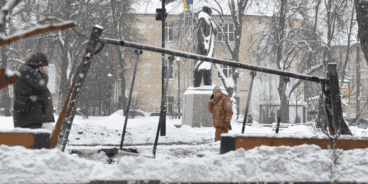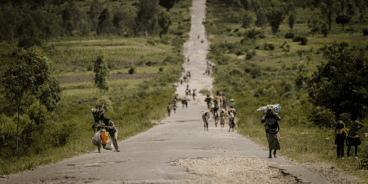
The Crisis in Syria Turns Four: Civil Society Organizations Call for Renewed Push on Restraint of Security Council Veto Use
To mark the occasion of the 4th anniversary of the conflict in Syria, 47 civil society organizations have called on the UN Security Council to renew their efforts to secure agreement on restraining the use of the veto in mass atrocity situations.
This Sunday, 15 March 2015, marks the 4-year anniversary of the crisis in Syria. For over 1,460 days, the Assad regime—and to a lesser extent, elements of the opposition—have inflicted a ruthless succession of war crimes and crimes against humanity against civilian populations in Syria. Such atrocities, which according to UN Secretary-General Ban Ki-moon should “shock the international conscience”, include the intentional starving of entire communities for the purpose of gaining a military advantage; the terrorizing of populations through the illegal use of barrel bombs and chemical, artillery, and cluster munition assaults; and inflicting gruesome torture techniques upon thousands of prisoners.
And yet—despite the staggering figures of 210,000 dead, 3.8 million civilians seeking refuge in neighboring countries, and 7.8 million internally displaced—the hopes for an end to the Syrian crisis have dwindled rather than improved over the course of 2014. Though the Assad regime’s human rights violations dwarf those of all other actors, the emergence of the Islamic State of Iraq and the Levant (ISIL), a new actor ready and able to commit grisly crimes, has further heightened the risk of mass atrocities in Syria. ISIL’s dramatic rise has been used as a tool by the Assad regime to legitimize its inexcusable actions in the name of fighting ‘terrorists’—a catch-all term used by the government when referring to protestors since the start of the crisis. Furthermore, as the international community increases its response to the crimes committed by ISIL, it risks overshadowing efforts to respond to and resolve the larger Syrian crisis, thus further empowering the Assad government.
In 2005, UN Member States agreed that they had an individual as well as collective responsibility to protect populations from genocide, war crimes, crimes against humanity, and ethnic cleansing—a responsibility which the Syrian government has clearly failed to uphold. However, the below signatories welcome the role that many have played in upholding their Responsibility to Protect by taking strong, often unprecedented measures within their mandates in an attempt to protect Syrians. Such actions include, inter alia, the six General Assembly resolutions on the crisis; the establishment by the Human Rights Council of an Independent Commission of Inquiry to investigate atrocities; the sanctions and arms embargoes imposed by the League of Arab States; the absorption of millions of Syrian refugees by Lebanon, Jordan, and Turkey; and the consistent monitoring/documentation, advocacy, and delivery of aid by civil society.
Nevertheless, the UN Security Council, largely due to the veto power wielded by Russia and China, has failed to match the unparalleled actions mentioned above. Despite displaying fleeting unity on resolutions on the removal of chemical weapons and the delivery of humanitarian aid, the four vetoes cast by Russia and China on most Security Council resolutions pertaining to Syria point to that body’s powerlessness to uphold RtoP when the veto is used. Such blatant inaction by the UN organ chiefly responsible for maintaining international peace and security has exacted catastrophic consequences on the people of Syria by delaying and hindering early and subsequent international action.
In this regard, the undersigned civil society organizations working to advance the Responsibility to Protect reiterate their support for efforts being taken, including under the leadership of France as well as Member States within the Accountability, Coherence, and Transparency Initiative, to ensure that Permanent Members refrain from using their veto power when confronted with a crisis in which civilians are at impending risk of atrocity crimes.
A refusal by the Permanent Members to use their veto when the Security Council is facing the most daunting of challenges—that of responding to mass atrocities—would mark a historic step for the Council, both in terms of upholding its Responsibility to Protect and in preserving its legitimacy as the primary organ responsible for maintaining international peace and security. Furthermore, such a measure would both help the international community to speak with one voice when responding to the threat or commission of such crimes and ensure that the aforementioned efforts to protect populations undertaken by other actors are not in vain.
The undersigned civil society organizations who are actively working to promote RtoP and protect populations from these most horrific crimes thus urge actors at all levels to remain closely engaged with this issue and continue to advocate for Permanent Members to not obstruct united action to protect populations from atrocities. Four years – forty-eight months – 1,460 days of atrocity crimes show the desperate need for such unity—and the appalling price of not acting on the Responsibility to Protect.
Signed:
- Action on Societal Violence-KAFA (Jordan)
- Action pour le Développement et la Paix Endogènes (Democratic Republic of Congo)
- Al Adala Centre for Human Rights (Saudi Arabia)
- Alternative ASEAN Network on Burma (Thailand)
- American Iranian Council (Iran)
- The Arab Program for Human Rights (Egypt)
- The Arab Organization for Human Rights—Libya
- The Arab Organization for Human Rights—Mauritania
- Asia-Pacific Centre for the Responsibility to Protect (Australia)
- Budapest Centre for the International Prevention of Genocide and Mass Atrocities (Hungary)
- Canadian Centre for the Responsibility to Protect
- Centre for Media Studies and Peacebuilding (Liberia)
- Coalition for Justice and Accountability (Sierra Leone)
- Education Centre on the Human Rights of Women Morocco
- Droits Humains Sans Frontières (Democratic Republic of Congo)
- Free Tunisia
- Genocide Alert (Germany)
- Genocide Watch (USA)
- Global Centre for the Responsibility to Protect (USA)
- Global Justice Centre (USA)
- Global Political Trends Centre (Turkey)
- Human Rights Information and Training Center (Yemen)
- Human Security Initiative (Sudan)
- Igarapé Institute (Brazil)
- International Coalition for the Responsibility to Protect
- Inter-Religious Council for Peace-Tanzania
- Justice Africa Sudan
- Justice Without Frontiers (Lebanon)
- Legists Association of Kuwait
- LuaLua Centre for Human Rights (Bahrain)
- Middle East Non-Violence and Democracy (Palestine)
- Minority Rights Group International (United Kingdom)
- Montreal Institute for Genocide and Human Rights Studies (Canada)
- Nuon Organization for Peacebuilding (Syria)
- PeaceNet Kenya
- Permanent Peace Movement (Lebanon)
- Salam al Rafidain Organization (Iraq)
- Scientific Association of Young Political Scientists (Greece)
- The Stanley Foundation (USA)
- United Nations Association of Denmark
- United Nations Association of Sweden
- United Nations Association of the United Kingdom
- United to End Genocide (USA)
- Vision-Gram International (Canada, Democratic Republic of Congo)
- Women’s International League for Peace and Freedom-Netherlands
- World Federalist Movement—Institute for Global Policy (Netherlands, USA)
- Zarga Organization for Rural Development (Sudan)
Related Content


Atrocity Alert No. 466: Ukraine, Syria and Crimes Against Humanity Treaty
